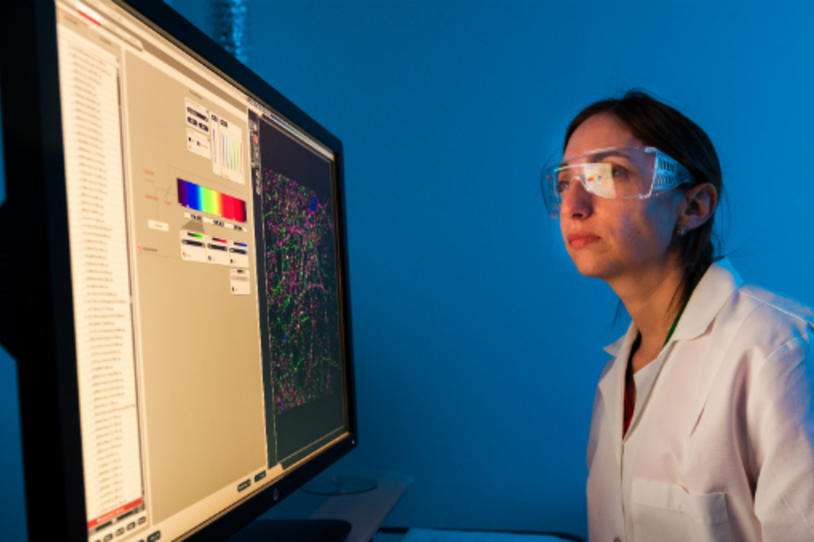
The Michael J. Fox Foundation for Parkinson's Research (MJFF) announces 35 new grant awards totaling more than $5.6 million. The selected projects reflect our research strategy to define, measure and treat Parkinson’s disease. We also awarded grants to help develop the research tools the field needs to advance.
All of our funding decisions serve our mission to find a cure for Parkinson’s and improved treatments for those living with the disease today. Many of the 35 funded studies involve PINK1 and LRRK2, two genes associated with increased risk for Parkinson’s. Highlights of these studies follow. For more information on recent MJFF-supported projects, visit our Funded Studies page.
Define
We seek to understand the causes of Parkinson’s, its progression and the factors that account for the variability of the disease. We recently issued four new grants in this area at a total of $460,023. Highlights follow:
- Matthew S. Goldberg, PhD, at the University of Alabama at Birmingham, is studying the connection between Parkinson’s-linked mutations in the PINK1 gene and immune cell activity. His previously funded work showed PINK1 deficiency may allow an overactive immune response, which could harm cells. This study could help better understand which immune cells may play a role in Parkinson’s, which could point to new therapeutic targets.
- Miratul Muqit, MD, PhD, at the University of Dundee in Scotland, is looking for another connection to PINK1. His work has shown PINK1 modifies a class of proteins called Rab GTPases and boosting that interaction may help protect cells. Muqit is searching for a protein that works with PINK1 on Rab GTPases; this protein could be a new therapeutic target.
Measure
MJFF funds the discovery of methods to diagnose Parkinson’s, measure its progression and assess the effectiveness of treatments for it. We recently supported 16 new projects in this area with a total of $3,746,796. Descriptions of several of the grants follow:
- Oguz Akbilgic, PhD, at the University of Tennessee Health Science Center in Memphis, is building artificial intelligence models to look for signs of early Parkinson’s disease in electrocardiogram (EKG) data, which measures the electrical activity of the heartbeat. Dysfunction of the nervous system in Parkinson’s could cause subtle changes in EKG, and computer models may be able to tell who may go on to develop clinical symptoms.
- Frank Hsieh, PhD, at Massachusetts-based biotech Nextcea Inc., will measure levels of a lipid (fatty acid) called BMP in urine and spinal fluid samples collected through MJFF-sponsored studies. This lipid is higher in people with LRRK2 mutations and could be a biological marker of LRRK2 levels, which could help test therapies against that target.
Treat
These awards directly fund the development of treatments to slow or stop Parkinson’s and alleviate its symptoms. We recently selected four projects for grants in this area at a total of $670,129. These include:
- Dario Alessi, PhD, also at the University of Dundee in Scotland, is working on a therapy against Rab protein activity too. Mutations in the LRRK2 gene also cause Parkinson’s and may activate Rab proteins too much. Alessi has found that the protein phosphatase (PPM1H) switches off LRRK2 activation of Rabs, and his team is now looking for drugs that increase PPM1H function.
- Nicholas T. Hertz, PhD, at the San Francisco-based Mitokinin LLC, is testing drugs to increase levels of PINK1 protein, which may protect brain cells.
- Michael Gordon Kaplitt, MD, PhD, at Weill Cornell Medical College in New York, is investigating the impact of treatment with LRRK2 inhibitors — a therapeutic approach already in clinical trials to slow or stop disease — on dyskinesia, a side effect of levodopa treatment. Delving into potential unintended consequences of therapies is important for patients’ quality of life.
Tools
We ensure the field has the research tools it needs to advance, such as assays, cells lines, and DNA plasmids. We recently supported 11 new projects in this area with a total of $786,508. Highlights follow:
- Hilal A. Lashuel, PhD, of ND BioSciences in Switzerland, is generating, characterizing and producing a small batch of the protein alpha-synuclein in a particular form (oligomers), which other grantees will use to develop tests to measure this protein in human samples.
- A handful of grantees are creating and describing antibodies against proteins including Rabs and PINK1, which are useful tools to measure and analyze these targets.
- Our partner in Spain is receiving additional support for management of our Fox Trial Finder study matching tool in that country, encouraging use from study sponsors and participants.
